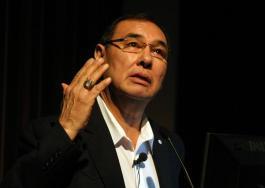By Jamie Ross
Daily Gleaner
May 30, 2011
http://dailygleaner.canadaeast.com/front/article/1410687
 |
| Raising awareness: Chief Wilton Littlechild gives a speech at Congress 2011 in Fredericton. The Truth and Reconciliation commissioner says the residential school program tore apart families. See Pages A4-5 for more on Congress 2011. |
Chief Wilton Littlechild said he was beaten with a hockey stick for speaking his native language and was referred to by number, not by name, throughout the 14 years he spent in the residential school system as a child.
The Truth and Reconciliation commissioner addressed the challenges and successes of the commission during one of the Big Thinkers lectures at Congress 2011.
He shared harrowing tales of abuse that as many as 80,000 First Nations children experienced during their time in the residential school system, the results of which have been called a national crime.
"The record states that it was to kill the Indian in the child, and to assimilate all of us into the dominant society," said Littlechild. "To take our language and culture away from us by preventing us from practising it."
The court-ordered Truth and Reconciliation Commission was established in June 2008 with the goal of uncovering the systematic abuse of First Nations children in residential schools.
Now halfway through its mandate, Littlechild, who spent 11 years at Ermineskin Indian Residential School, said he believes progress is being made. He said the truth is coming out through testimonies before the commission.
But more need to be done to raise awareness, he said.
"People just don't know the history and once they know the history, they'll make the connection as to why there is such a high rate of addiction, why such a high rate of suicide and unemployment," he said.
"There's a direct link there. Canada needs to know about this legacy, and it's reaching out to find out what happened, and once they're aware we can work together to find a solution."
Dating as far back as 1840, First Nations children as young as 10 months old were taken from their parents and moved into schools that were sometimes thousands of kilometres away, destroying families and leaving many children with deep emotional scars.
"Because you're separated from them physically, the family bond is very strained if not broken," said Littlechild. "And that impact causes a lot of us, in turn, to turn to alcohol or drugs or other negative choices, because that connection with the parent isn't there."
Prime Minister Stephen Harper apologized in 2008 for the abuses and the existence of the residential school system.
The last school closed in 1996, Littlechild said.
He said despite the harsh reality he faced as a child, he was lucky enough to overcome the adversity, and there's still hope that one of the greatest wrongs can be made right.
"The key for me was to turn a negative into a positive, and use a bad situation to make good," said Littlechild. "That you can come through it all and be a good human being. There are success stories across the country like that."
Contact: ross.jamie@dailygleaner.com
Any original material on these pages is copyright © BishopAccountability.org 2004. Reproduce freely with attribution.